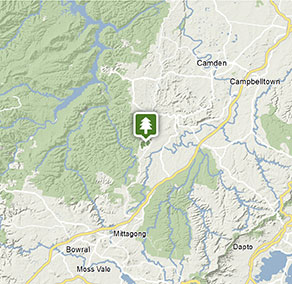Thirlmere Lakes National Park
Visitor info
All the practical information you need to know about Thirlmere Lakes National Park.
Getting there and parking
Get driving directions
From Picton:
- Travel south along Remembrance Drive. Turn right onto Thirlmere Way and then right onto Richardson Street, veering left at Westbourne Avenue and continuing on Barbour Road. You can enter the park on Slades Road or Pumphouse Road.
From Bargo:
- Head northwest on Remembrance Drive. At Tahmoor, turn left onto Bargo River Road and at Couridjah, turn right onto West Parade. Enter the park at either Pumphouse Road or Slades Road into Thirlmere Lakes National Park.
Park entry points
- Pumphouse Road access See on map
- Slides Road access See on map
Parking
- Werri Berri picnic area See on map
By bike
Check out the Bicycle information for NSW website for more information.
By public transport
Thirlmere National park is not accessible by public transport.
Best times to visit
There are lots of great things waiting for you in Thirlmere Lakes National Park. Here are some of the highlights.
Spring
Admire the ground orchids and active birdlife along Thirlmere Lakes track, or enjoy a pleasant picnic and barbecue at Lake Couridjah picnic area.
Winter
Photo opportunities with frost and misty lakes make this a great time of year to capture an iconic photograph.
Weather, temperature and rainfall
Summer temperature
Average
14°C and 28°C
Highest recorded
42.8°C
Winter temperature
Average
2°C and 17°C
Lowest recorded
-10° C
Rainfall
Wettest month
March
Driest month
September
The area’s highest recorded rainfall in one day
245.9mm
Facilities
Maps and downloads
Fees and passes
Park entry fees:
Under review. No park entry fees collected.
Prohibited
Pets
Pets and domestic animals (other than certified assistance animals) are not permitted. Find out which regional parks allow dog walking and see the pets in parks policy for more information.
Smoking
NSW national parks are no smoking areas.

Contact
- in the Sydney and surrounds region
Thirmere Lakes is open from from 5.30am to 8pm during daylight savings and 5.30am to 6pm rest of year. The park may have to close at times due to poor weather or fire danger.
-
-
Glenbrook office
02 4632 4500 Infoline
Contact hours: Entry station is only open on weekends, public holidays and school holidays. - 68 Bruce Road, Glenbrook NSW 2773
-
Email: npws.hawkesburynattai@environment.nsw.gov.au
-
Glenbrook office
Nearby towns
Picton (10 km)
Discover Picton's fine heritage architecture on a self-guided walking tour or visit historic Tahmoor House (limited open days). Enjoy a traditionally-brewed beer at George 4th Inn, opened in 1839 for travellers along the Great South Road.
Bowral (37 km)
Spring is tulip time while summer has fragrant roses and autumn, flowering bulbs. Bowral Tulip Festival runs from the end of September until early October; the Autumn Garden Festival is held in May.
Campbelltown (44 km)
For nature lovers, the Macarthur region has plenty of natural attractions. Explore nature reserves and wildlife trails or see spectacular native flora and fauna at the Australian Botanic Garden Mount Annan, the largest botanic garden in Australia.